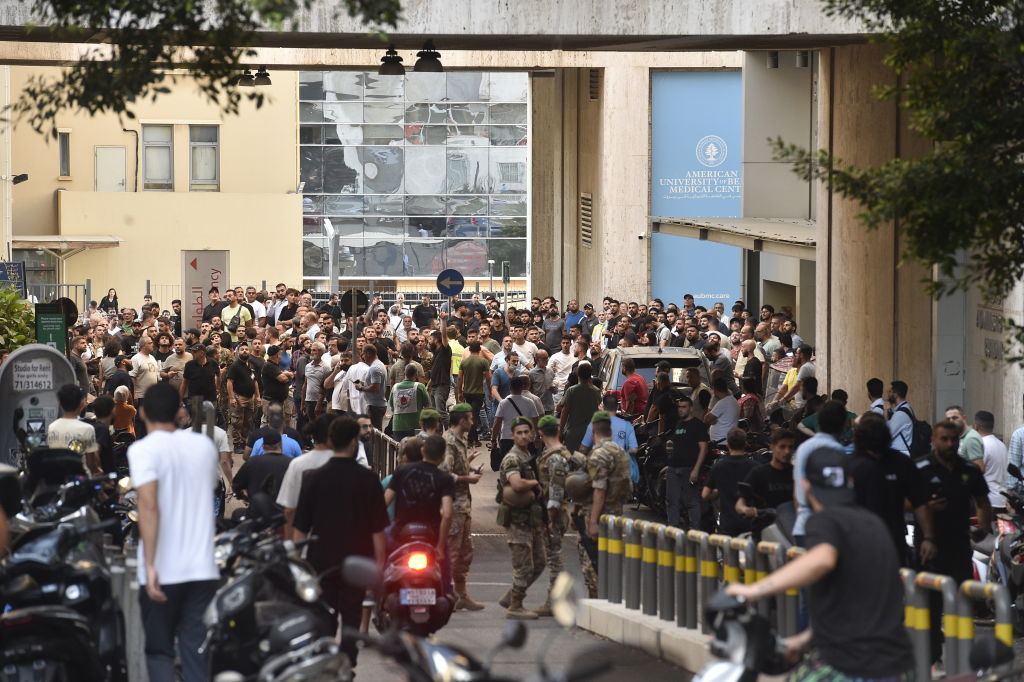At least nine people were killed and nearly 3,000 wounded when pagers used by Hezbollah members – including fighters and medics – detonated simultaneously across Lebanon.
Here’s what we know so far about the pager blasts.
WHEN AND WHERE DID THE BLASTS TAKE PLACE?
The detonations started around 3:30 p.m. local time in the southern suburbs of Beirut known as Dahiyeh and the eastern Bekaa valley – strongholds of the anti-Israel militant group Hezbollah.
They lasted around an hour, with Reuters witnesses and residents of Dahiyeh saying they could still hear explosions at 4:30 p.m. local time.
According to security sources and footage reviewed by Reuters, some of the detonations took place after the pagers rang, causing the fighters to put their hands on them or bring them up to their faces to check the screens.
HOW BIG WERE THE EXPLOSIONS?
The blasts were relatively contained, according to footage reviewed by Reuters. In two separate clips from the CCTV footage of supermarkets, the blasts appeared to only wound the person wearing the pager or closest to it.
Footage shot at hospitals and shared on social media appeared to show individuals with injuries of varying degrees, including to the face, missing fingers, and gaping wounds at the hip where the pager was likely worn.
The blasts did not appear to cause major damage or start any fires.
WHAT TYPE OF PAGER EXPLODED?
Images of destroyed pagers analysed by Reuters showed a format and stickers on the back that were consistent with pagers made by Gold Apollo, a Taiwan-based pager manufacturer.
The firm did not immediately reply to questions from Reuters. Hezbollah did not reply to questions from Reuters on the make of the pagers.
Hezbollah fighters had begun using pagers as a low-tech means to try and prevent Israeli tracking of their locations, two sources familiar with the group’s operations told Reuters this year.
Three security sources told Reuters that the pagers that detonated were the latest model brought in by Hezbollah in recent months.
WHAT CAUSED THE PAGERS TO EXPLODE?
Iran-backed Hezbollah said it was carrying out a “security and scientific investigation” into the causes of the blasts and said Israel would receive “its fair punishment.”
Diplomatic and security sources speculated that the explosions could have been caused by the devices’ batteries detonating, possibly through overheating.
Some experts speculated that Israel had infiltrated the supply chain for Hezbollah’s pagers.
Experts were mystified by the explosions but several who spoke to Reuters said they doubted the battery alone would have been enough to cause the blasts.
Paul Christensen, an expert in lithium ion battery safety at Newcastle University said the damage caused by the pager explosions seemed inconsistent with known cases of such batteries failing in the past.
“What we’re talking about is a relatively small battery bursting into flames. We’re not talking of a fatal explosion here. I’d need to know more about the energy density of the batteries, but my intuition is telling me that it’s highly unlikely,” he said.
SMEX, a Lebanese digital-rights organization, told Reuters that Israel could have exploited a weakness in the device to cause it to explode. It said the pagers could also have been intercepted before reaching Hezbollah and either tampered with electronically or implanted with an explosive device.
Israeli intelligence forces have previously placed explosives in personal phones to target enemies, according to prior reporting in the book “Rise and Kill First”. Hackers have also demonstrated the ability to inject malicious code into personal devices, causing them to overheat and explode in some instances.
WHAT HAVE THE AUTHORITIES SAID?
Lebanon’s foreign ministry called the explosions an “Israeli cyberattack,” but did not provide details on how it had reached that conclusion.
Lebanon’s information minister said the attack was an assault on Lebanon’s sovereignty.
Israel’s military declined to respond to Reuters questions on the pager blasts.
The U.S. State Department said Washington was gathering information and was not involved. The Pentagon said there was no change in U.S. force posture in the Middle East in the wake of the incident.
WHAT ARE THE IMPLICATIONS FOR THE ISRAEL-HEZBOLLAH CONFLICT?
Analysts see the threat of escalation between Israel and Hezbollah, which have exchanged cross-border fire since the start of the Israel-Hamas war in Gaza last October.
But experts are more skeptical, for now, about the potential for triggering an imminent all-out Israel-Hezbollah war, which the U.S. has sought to prevent and which it believes neither side wants.
Matthew Levitt, former deputy director of the U.S. Treasury’s intelligence office and author of a book on Hezbollah, said the pager explosions could disrupt its operations for some time.
Jonathan Panikoff, the U.S. government’s former deputy national intelligence officer on the Middle East, said Hezbollah might downplay its “biggest counterintelligence failure in decades” but rising tensions could eventually erupt into full-scale war if diplomacy continues to fall short.
(Reuters)














